
CUPERTINO, CA / ACCESSWIRE / March 29, 2021 / It's no secret that college admissions is challenging for Asian Americans. Admissions in America is not a meritocracy - low income, legacies, under-represented minorities, athletes, and LGBT groups are heavily favored in the process, which takes spots away from possibly more deserving applicants.
At the Ivy League, Stanford, and MIT, the Asian American population comprises roughly 20-25% of the student body for more than the past decade despite a dramatic increase in scores, national recognition, and extracurricular activities to boast. The only exception are schools like Caltech and Berkeley, which doesn't practice race-based admissions and has nearly 40% of the student body who are Asian.
A recent report by AdmissionSight, a top tier college admissions consulting company that boasts a 75% acceptance rate track record to the Ivy League, breaks down the numbers of Asian American admits at top universities such as Princeton, Harvard, Stanford, Yale, UChicago, MIT, Caltech, and other highly ranked institutions. Let's take a look at the data:

The official report by AdmissionSight may be found here.
"Asian Americans are definitely held to a much higher standard than their peers," says Eric Eng, the founder and CEO of AdmissionSight. "That's why we seek to help families in every way we can. If colleges demand more from our students, we'll work harder and make our students outshine their competition."
But using race and affirmative action is a poor way to judge an applicant. While it may make more sense to provide support to low income groups (as opposed to race) due to lack of resources, the advent of online education and ample free resources has significantly closed that gap as well. For colleges to prevent those who have a high degree of academic and extracurricular merit from matriculating on the basis of race (Asians, in particular - Jews, in the past) - is not okay.
A complaint filed with the U.S. Department of Education's Office for Civil Rights alleges that in order for Asian-Americans students to gain admission, they need to have SAT scores 140 points higher than white students, 270 points higher than Hispanic students, and 45 points higher than African American students.
Lawsuits have been filed with the Department of Education against elite schools like Harvard and Princeton in the past by highly competitive Asian applicants who decried that the admissions process wasn't fair.
College admissions officers will have some big decisions to make on how it treats Asians in the admissions process, especially at a time when violence toward the minority group is at an all time high. The recent uprising in racial discrimination against Asian Americans has led President Biden to urge Congress to "swiftly pass" hate crime legislation to address the rise in discrimination and violence against Asian Americans during the Covid-19 pandemic. The recent congressional hearing was the first of its kind in 34 years.
"Asian Americans, while considered minorities, are not treated as such when it comes to college admissions," says Eng. "In fact, Asian Americans are penalized for their race and don't get in despite having superb qualifications."
The bar is set significantly higher for Asian Americans. Most have to go above and beyond compete in regional and national competitions such as the Intel Science and Engineering Fair, form nonprofits to showcase their leadership, and attend prestigious summer programs while juggling SAT's and a rigorous course load of AP exams.
"That's why we are here for our clients," says Eng, whose company works with students from all over the world, including the Bay Area, New York, Boston, Shanghai, Taiwan, London, Singapore, and many others. "We arm them with all the resources and tools to get an edge in the admissions process. In this day and age when it is so competitive, separating yourself from the rest of the pack is a must to get your foot into the door."
There are certainly many sweeping changes this year due to college admissions including the cancellation of the SAT Subject Tests and the SAT going test-optional. As the level of anxiety grows amid the pandemic, college admissions has faced greater uncertainty as students and parents prepare for the upcoming admissions cycle. It will be interesting to see how it all plays out.
Media Contact:
AdmissionSight Inc.
info@admissionsight.com
(650) 338-8226
SOURCE: AdmissionSight
View source version on accesswire.com:
https://www.accesswire.com/637876/Asian-Americans-Diversity-and-Meritocracy-in-College-Admissions

